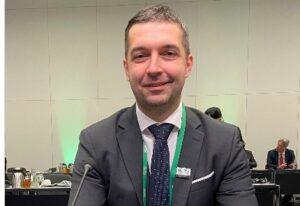Food waste must be further reduced
Zsolt Feldman, the State Secretary responsible for agriculture and rural development of the Ministry of Agriculture, presented the results of the fight against food waste in Hungary in recent years, at the food waste panel discussion of the World Food and Agriculture Forum.

(Photo: AM)
At the event organized with the participation of African, Asian and European countries, the state secretary drew attention to the fact that Hungary supports the United Nations Sustainable Development Goal on food waste, according to which food waste generated in the retail trade and at the consumer level must be halved by 2030.
Zsolt Feldman explained that during the past seven years, the level of annual food waste per capita in Hungary has decreased by 27 percent
This result is also thanks to the attitude formation and food waste prevention program, No Leftovers, launched by the National Food Chain Safety Office in 2016. In 2023, the Hungarian initiative received numerous international recognitions, including being included in the top three environmental protection programs of the European Union. In addition, additional measures are aimed at preventing and reducing the generation of food waste in the commercial sector as well, he added. He explained that reducing food loss is crucial not only in households and retail, but also in the production sector. The development of fruit and vegetable cold storage facilities supported in the framework of the Rural Development Program, post-harvest technologies, and the implementation of grain storage, cleaning and drying facilities for field crop growers all contribute to ensuring that the money and energy invested in production is not wasted due to poor storage technology. in the post-harvest period. This is not only useful for the producer, but essentially contributes to reducing losses in the food chain process.
The Ministry of Agriculture treats the reduction of food waste as a priority when it takes over the presidency of the European Union in the second half of 2024
In this process, we pay particular attention to the transfer of nowledge, the exchange of experience, and the further development of research collaborations, the state secretary emphasized. This year’s World Forum on Agriculture and Food was organized around the future of food systems and the steps necessary to end the global phenomenon of hunger.
AM
Related news
AM: from ham to egg dye, comprehensive Nébih inspection is underway until Easter
🎧 Hallgasd a cikket: Lejátszás Szünet Folytatás Leállítás Nyelv: Auto…
Read more >Fashion, drones and sustainability – the new face of agriculture at the AgriTech InnoExpo event
🎧 Hallgasd a cikket: Lejátszás Szünet Folytatás Leállítás Nyelv: Auto…
Read more >







